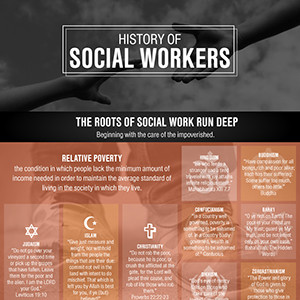The history of social work dates back thousands of years when organized religious groups cared for the impoverished.
History of Social Workers
The roots of social work run deep
Beginning with the care of the impoverished.
Definition:
Relative Poverty– The condition in which people lack the minimum amount of income needed in order to maintain the average standard of living in the society in which they live.
Baha’i– “O ye rich on Earth! The poor in your midst are My trust; guard ye My trust, and be not intent only on your own ease.”–Baha’u’llah, The Hidden Words
Buddhism– “Have compassion for all beings,rich and poor alike; each has their suffering. Some suffer too much, others too little.” Buddha
Confucianism– “In a country well governed, poverty is something to be ashamed of. In a country badly governed, wealth is something to be ashamed of.” Confucius
Christianity– “Do not rob the poor, because he is poor, or crush the afflicted at the gate, for the Lord will plead their cause, and rob of life those who rob them.” Proverbs 22:22-23
Hinduism– “He who feeds a stranger and a tired traveler with joy attains infinite religious merit. ” Mahabharata XIII 7.7
Islam– “Give just measure and weight, nor withhold from the people the things that are their due: commit not evil in the land with intent to do mischief. That which is left you by Allah is best for you, if ye (but) believed! ” Qur’an 11:85-86
Sikhism– “God’s eye of mercy falls on those who take care of the lowly.” Guru Granth Sahib: Sri Raag
Zoroastrianism– “The Power and glory of God is given to those who give protection to those in need.” Yasna 27.13, Avesta
Judaism– “Do not go over your vineyard a second time or pick up the grapes that have fallen. Leave them for the poor and the alien. I am the LORD your God.”Leviticus 19:10
With nearly every major world religion insisting we take care of our poor.
State and Church Supported Aid is Ancient
Constantine I (272-337 AD):
Legalized Christianity.
Christian Institutions including the following were created:
1.) Poorhouses
2.) Houses for the elderly
3.) Hospitals
4.) And orphanages.
Founded in part from grants from the Roman Empire.
Earliest Hospitals
271 AD–Gundeshapur, one of the larger cities in the Persian Empire
Was staffed by Indian, Persian, and Greek doctors and scholars
500 AD-forward-Constantinople had two of the earliest hospitals.
With male and female doctors, professional nurses, orderlies, and training programs.
In the middle ages
Roman Catholic Church helped the poor.
Mostly through monasteries.
Such as the:
6th century
Rule of Saint Benedict–including the pledge to forego private ownership
And the Mendicant orders:
12th-13th centuries
Such as the Franciscans and Dominicans–who vowed to take up lives of poverty and service
The Missionaries of Charity, founded by Mother Teresa (1940) take an additional vow to help the “poorest of the poor.”
Protestant Europe led to the creation of civic institutions helping the poor.
When Geneva converted to protestantism in 1535 they replaced all Catholic organizations with one “general hospital.”
For the poor, orphans, elderly, and those unable to work.
A dark day for social work[6]:
England’s 15th century “Vagabond Act” allowed for the arrest of all vagabonds.
Whether they were unemployed, underemployed, looking for work, or the impotent poor.
Even the sick, elderly and disabled could be arrested!
Until the 19th century charity was direct.
Including: money, food, and other helpful goods.
Instead of trying to change the root causes of poverty.
Modern Day Social Work
Began in the 1800’s in Britain and the US.
Trends:
1.) Industrialization
2.) Movement to large urban centers
3.) Christian “missionary” movement
Issues:
1.) Poverty, disease, prostitution in cities
2.) Child Labor
3.) Larger destabilizing forces
The settlement movement focused on removing the causes of poverty through the 3 “Rs”:
Research
Reform
Residence
20th century
Debate: “Is Social Work a Profession?”
Yes: Mary Richmond’s Charity Organization Society
–Reasons: focus on scientific method, efficiency, and prevention
No: Jane Addam’s Settlement House Movement
–Reasons: immersion into the problem leads to understanding of clients
The Winner: Yes.
The other winner: Jane Addams was one of the first women to win a Nobel Peace Price in 1931.
1898- First social work class offered at Columbia University.[7]
A century of social work has had a massive impact
Giving us many benefits we take for granted:
Civil Rights regardless of gender, race, faith, or sexual orientation.
Protection of Worker’s Rights
Protection and treatment of the mentally ill
Access to healthcare for the disabled and elderly
Protection for children against abuse and neglect
Today social work is more vibrant than ever
607,300 social work jobs in America[8]
In:
Hospitals
Nursing Homes
Mental Health Clinics
Private Practice
Government
Schools
Higher Education
Substance Abuse Clinics
Military
Correctional Facilities
And Child Welfare Agencies
Citations:
- http://home.snu.edu/~hculbert/poor.htm
- http://www.huffingtonpost.com/2012/09/05/religion-and-poverty-reli_n_1854606.html
- http://education-portal.com/academy/lesson/what-is-relative-poverty-definition-causes-examples.html#lesson
- https://www.colsoncenter.org
- http://www.naswdc.org/pressroom/features/general/history.asp
- http://www.bls.gov/ooh/community-and-social-service/social-workers.htm#tab-3
Related:



